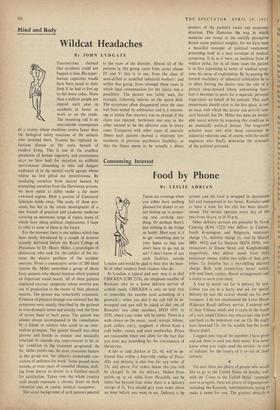Mind and Body
Wildcat Headaches
By JOHN LYDGATE
For the moment there is one subject which has been neatly introduced by a couple of lectures recently delivered before the Royal College of Physicians by Dr. Henry Miller, a neurologist of distinction who took for the subject of his lec- tures the elusive problem of the accident neurosis. From a consecutive series of 200 head injuries Dr. Miller unearthed a group of about forty patients who shared features which pointed an important social moral. All of these patients displayed neurotic symptoms whose severity was out of proportion to the extent of their physical injuries. The picture was remarkably consistent. Evidence of physical damage was minimal but the symptoms were usually described by the patients in over-dramatic terms and usually took the form of severe head or back pains. The patient was almost always accompanied to the consultation by a friend or relative who acted as an over- zealous prompter. The patient himself was often gloomy and hostile in manner and unusually reluctant to concede any improvement in his or her condition as thig treatment progressed. As Dr. Miller points out, the most consistent feature in this group was 'the subject's unshakable con- viction of unfitness for work.' Some passed many months or even years of resentful idleness, drift- ing from doctor to doctor in a fruitless search for satisfaction. Taken over the whole country such people represent a chronic drain on both industrial and, of course, medical manpower.
The social background of such patients pointed to the roots of the disorder. Almost all of the patients in this group came from social classes IV and V; that is to say, from the class of semi-skilled or unskilled industrial workers: and within that group, from amongst those cases in which legal compensation for the injury was a possibility. The picture was rarely seen, for example, following injuries on the sports field. The symptoms often disappeared once the case had been settled by arbitration and it is interest- ing to notice that recovery was as prompt if the claim was rejected. Settlement one way or the other seemed to be the effective cure in many cases. Compared with other types of neurotic illness such patients showed a relatively low incidence of previous psychiatric disability, so that the illness seems to be actually a direct product of the patient's social and economic situation. This illustrates the way in which medicine can reveal to the socially perceptive doctor acute political insights; for we have here a beautiful example of political resentment presenting itself in a neat envelope of medical symptoms. It is, as it were, an insidious form of wildcat strike, for in all these cases the patient is in fact expressing in terms of medical symp- toms his sense of exploitation. By by-passing the normal machinery of industrial arbitration he is in effect forcing the doctor into the role of a private shop-steward whose unknowing func- tion it becomes to press for a separate, personal wage-claim on behalf of his patients. That such resentments should exist in the first place, is not an issue with which the doctor can directly con- cern himself, but Dr. Miller has done an invalu- able social service by exposing this condition as an essentially political disease. The long-term' solution must rest with those concerned in industrial relations and, of course, with the social engineers who finally determine the structure of the political pyramid.














































 Previous page
Previous page